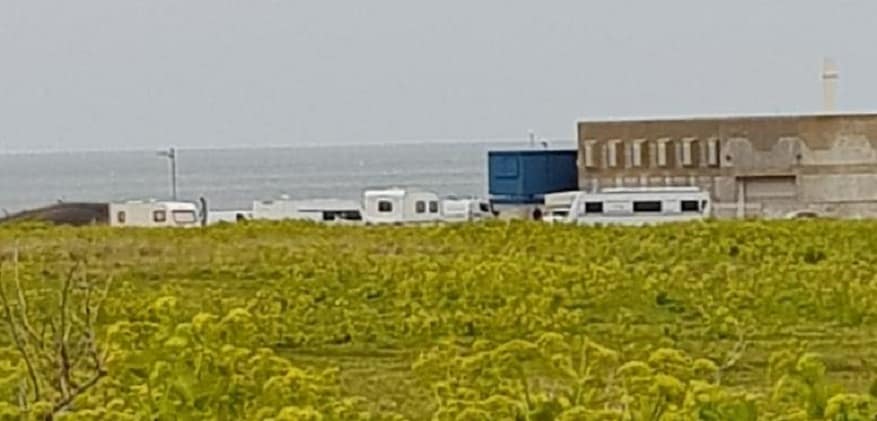
A section of Ramsgate Port will provide a temporary site for a Traveller group that has been at Palm Bay since last month.
Following a number of complaints, Thanet District Council attended Magistrates’ Court on Thursday, May 27 seeking an order for removal of the ‘unauthorised encampment’ at Palm Bay.
The order was unsuccessful on welfare grounds and the council was required to identify an alternative site in order to comply with the court.A Thanet council spokesperson said: “A small section of land at the Port of Ramsgate has been identified as a temporary alternative site for the group of 13 caravans. This will be on the lorry park between the roundabout on Military Road and the former terminal building.
“Arrangements are currently being made to provide fencing, sanitary provision and fresh water. Once in place the group will be reallocated to the site.
“This is a temporary arrangement which is required in order to comply with a ruling from the Court.
“The site has been identified on the grounds of the ability to provide the welfare arrangements required with access to water and sanitation, whilst being outside of a residential area and causing as little disruption to commercial activity of the Port as possible.
“The council will be taking steps to mitigate against further unauthorised encampments at Palm Bay once the site is clear. This includes increasing the height of the grass bank to bring it to a level too high to drive over.”
Previous temporary site proposals
In December 2019 approval was given for work to assess Potten Street in St Nicholas-at-Wade, Tivoli Brook in Margate and Ramsgate Port for use as temporary tolerated stopping sites.
But both Ramsgate Port and Tivoli Brook were removed from the plans in July 2020.The proposal for Ramsgate Port was scrapped because it was “undergoing a feasibility study and the proposed area is in use for the storage of cars and is returning a revenue, it is also an industrialised area and not suited to families and young children.”
‘Tolerated’ pitches’
A need for 7 permanent and 5 transit vehicle pitches in Thanet was identified in a study for Thanet council. Temporary tolerated pitches are when unauthorised encampments stay for an agreed amount of time.
The council says this means smoother enforcement is easier on those unauthorised encampments which chose to ignore the direction and stay on other land.
A temporary tolerated site also allows easier management of amenities such as waste collection and toilet provision, reducing the impact on the local area.
A review of sites was carried out. In August 2020 plans to use Potten Street car park at St Nicholas and land at Shottendane Road in Margate were put on hold.
Thanet council made a ‘call for sites’ through its Local Plan review. No further sites have yet been announced.
The aim was to use tolerated sites on a rotation basis to alleviate the issue of unauthorised camps on the isle. Thanet currently does not have an authorised Traveller site, with the nearest being in Canterbury and Dover.
Friends, Families and Travellers charity
The Friends, Families and Travellers charity say local authorities need to provide adequate land for travellers to stop as many families are forced to pull up in public spaces and on private land. This leaves many with interrupted access to basic water and sanitation, education and healthcare.
.An FFT spokesman previously told The Isle of Thanet News that sites should be made available, saying: “We would recommend that the district council and local authority work with the Traveller community in the area to identify land that would be suitable for building new sites to accommodate these residents.”
A ruling on ‘wide injunctions’ against Travellers and Gypsies
A landmark ruling last month has marked the end of councils using blanket bans against Gypsies and Travellers who have nowhere to stop.
The judgement was that wide injunctions can only be granted against individuals who can be named or properly identified. Councils need to demonstrate they have notified them about the legal proceedings. Wide injunctions cannot apply to anyone who is not notified about the final court hearing. This means that any Gypsies or Travellers who come on the land at a later date will not be covered by the injunction.
Wide injunctions against “persons unknown” have been used by councils in England to prevent Gypsies and Travellers from stopping on public land since 2015.
At a High Court hearing in January, 13 councils from across England defended their wide injunctions. Friends, Families and Travellers, London Gypsies and Travellers and the National Federation of Gypsy Liaison Groups acted as interveners in the case with legal representation from Garden Court Chambers and Community Law Partnership. Following the judgment, it is likely that all injunctions against “persons unknown” will be discharged (source Families, Friends and Travellers charity).

